Two Conferences Held for the Council Members of 6 Functional Organizations
Foundation of Suggesting Practicable Policies Provided through In-Depth Discussion Among the Members by Function
The National Unification Advisory Council (Executive Vice-chairperson: Hyun Kyung-dae, Secretary General: Park Chan-bong) held the functional policy conference in the areas of culture, art, health & medical care, and economy last Oct. 15 and 16 at Daejon Yooseong Hotel, followed by the conference of citizen society, youth, and welfare on Oct. 16 and 17.
Discussions were held under the subjects of "Normalization of Inter-Korean Relations Through the Korean Peninsula’s Trust-Building Process" and "Practical Preparation for National Unification by Reinforcing Capabilities in Preparation for National Unification" with the 380 council members of 6 functional organizations.
Keynote addresses were given by Hyun Kyung-dae, Executive Vice-chairperson of NUAC, and Jeon Seong-hun, Director of the Korea Institute for National Unification, at the policy conference. Prof. Cha Mun-seok and Choi Jin-wook, Council Member, also gave presentations on national unification. The conference allowed the attendants to engage in group discussion on the given subjects and comprehensive discussions.
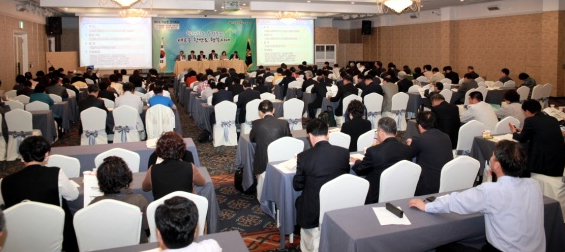
Policy Conference of Culture, Arts, Health & Medical Care, and Economy Functions
★ First Policy Conference: Culture, Arts, Health & Medical Care, and Economy Functions (Oct. 15 ~ 16)
- Normalization of Inter-Korean Relations through the Korean Peninsula’s Trust-Building
Process -
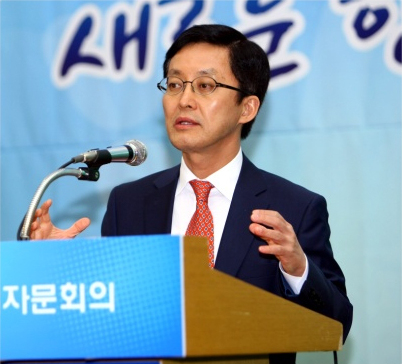
Jeon Seong-hun, President of KINU
Jeon Seong-hun, President of the Korea Institute for National Unification (KINU), gave a special lecture on the "Recent International Situation and Inter-Korean Relations" at the first policy conference.
"International situations face various issues in broad ranges such as diplomatic relations, conflict, and crisis," he said. He also explained how the prevailing situations in Syria and Iran could affect the Korean Peninsula, including the national unification policy of the Park Geun-hye administration. "The inter-Korean policy is being promoted by the two axles of strong national security and opening of the window of dialogue with North Korea," he added.
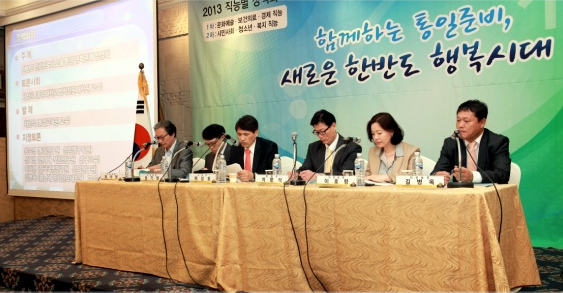
Policy Conference of Culture, Arts, Health & Medical Care, and Economy Function
Prof. Je Seong-ho of Chung-Ang University presided over a policy conference titled "Normalization of Inter-Korean Relations through the Korean Peninsula’s Trust-Building Process,” wherein Prof. Cha Mun-seok of KINU raised the issues for the Council members to discuss and express their opinion.
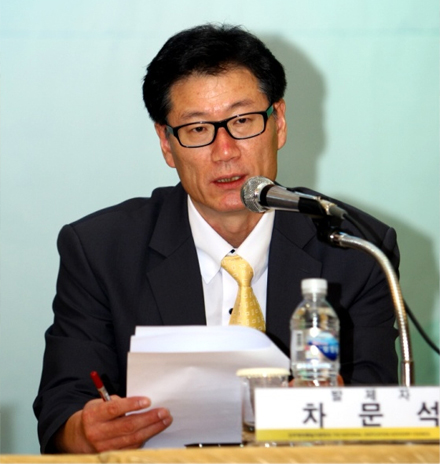
Prof. Cha Mun-seok of Korea Institute for National Unification (KINU)
According to Prof. Cha Mun-seok, the series of nuclear tests by the North Korean regime in a bid to secure the position of a nuclear power state has been seriously damaging the expansion of inter-Korean exchanges and efforts to build trust between the two Koreas at a time when the 60th anniversary of armistice agreement between South and North is being commemorated. The Park Geun-hye administration needs to accommodate the advantages of inter-Korean policy implemented by the past governments of South Korea to overcome such limitation on the policy, at the same time promoting the "Korean Peninsula’s Trust-Building Process.” In this regard, he suggested the following: ▲ Continue to solve the age-long issues of separated families, Korean forces who are prisoners of war in North Korea, and Korean civilians abducted by North Korea, which are all purely humanitarian problems; ▲ Establish regular dialogue channels between Seoul and Pyongyang and hold dialogues between them according to the international standard to implement the spirit of past agreement; ▲ Expand friendly exchanges including normalization of the Gaeseong Industrial Complex and construction of environmental community, and; ▲ Promote the "Vision Korea Project."
Attendants exchanged various opinions during the discussion. For one, follow-up measures are required to promote the Korean Peninsula’s Trust-Building Process, i.e., strengthen the positions of the soft-liners who are reformation-oriented in Pyongyang, enhance the possibility of promoting a new economic policy, normalize inter-Korean relations, expand friendly exchange and cooperation, achieve the "Vision Korea Project" early, normalize the Gaeseong Industrial Complex for further development, and define the clear concept of internalization of the industrial complex along with its implementing road map. The council members also agreed that they need to establish proper measures to pave the way for the age of coexistence and cooperation in terms of national integration in addition to strengthening capabilities for national security.
The Council members expressed their opinions actively during the group discussions and comprehensive discussions. Group discussions were held to deal with itemized subjects.
The Culture and Arts Function discussed the "significance of the DMZ World Peace Park as well as how to promote the project" to preserve the natural environment in the zone, introduce a monument symbolizing the peace of each country in the world, and establish an education and training center for national unification near DMZ and a movement to walk 155 miles along the DMZ.
The Health and Medical Care Function discussed the "humanitarian support for the vulnerable class of people such as infants and pregnant women,” which should be the momentum for establishing friendly relations for the Korean Peninsula’s Trust-Building Process in real terms. Such support may include supplying vaccination, powdered formula, baby food, and medicine. The Support Project needs to be diversified into technical support including education and medical care rather than passive support of supplying goods only. Other opinions suggested in the discussion included the need to provide support to North Korea in the form of goods supplied by pure civic societies or religious groups of South Korea rather than in cash.
Finally, the Economy Function exchanged various opinions and ideas on the "Direction to Promote the Korean Peninsula Trust-Building Process and Inter-Korean Economic Cooperation.” Some of the opinions presented during the discussions were: Revitalizing the economic, cultural, and livelihood communities between South and North so that the people on the two sides can benefit together to disseminate free democracy; Convincing the neighboring countries that the unification of the Korean Peninsula will not be detrimental to their interest but lead to their best interest and benefit; Resuming economic cooperation with Pyongyang, and; Development of new tourism resources using the Gyeongui Line connecting South and North for the sightseeing of Mt. Geumgang.
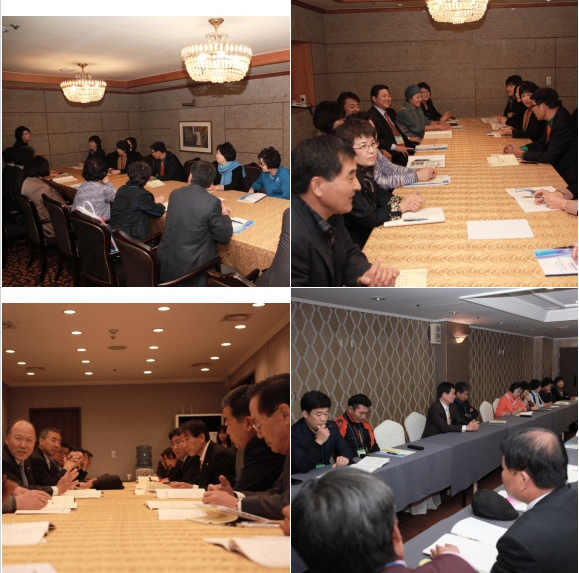
Group Discussion during the First Policy Conference
On the second day of the conference, a special lecture was given on "Speech Catching the Mind." The First Policy Conference was finalized by group discussions and comprehensive discussion with all the council members present.
★ Second Policy Conference: Civic Society, Youth, and Welfare Function (Oct. 16 ~ 17)
-Practical Preparation for National Unification by Strengthening Capabilities –
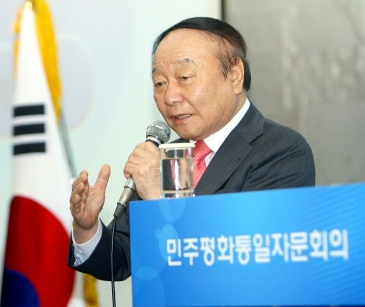
Hyun Kyung-dae, Executive Vice-chairperson of NUAC
The Second Policy Conference started with a keynote address by Mr. Hyun Kyung-dae, Executive Vice-chairperson of NUAC.
"We should maintain dignified confidence in the history of Republic of Korea, and our young generations are required to pay keen attention to the issue of national unification, which can provide all of us with freedom and prosperity,” he stressed, adding that unification is the best way to solve all the current problems of South and North in one shot. According to him, the roles of the 16th NUAC members would make great contributions to concentrating all the capabilities of the people for unification. He then asked the council members to stand at the forefront of the unification movement.
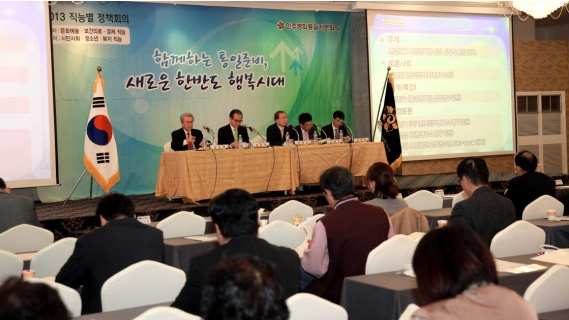
Policy Conference of Civic Society, Youth, and Welfare Function
Jeon Kyung-man, Executive Researcher of the Korea Research Institute for Strategy, presided over the following policy conference hold under the theme "Practical Preparation for National Unification by Strengthening Capabilities for Unification.” Choi Jin-wook, Senior Researcher of Korea Institute for National Unification raised a subject for the Council members to express their opinions thereupon.
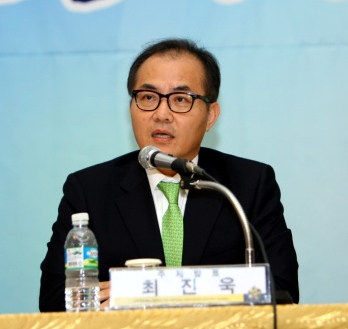
Choi Jin-wook, Senior Researcher of the Korea Institute for National Unification
Choi Jin-Wook, Council member, said that the tremendous amount of unification cost and chaos occurring in the unified Germany weakened the Korean people's will for national unification and cast doubt on unification. Such leads to public indifference to national unification among the Koreans, which could cause confusion due to unprepared unification and continued status quo of division, evasion of unification. Finally, we might lose the opportunity for unification. In this regard, to enhance the strong will of unification and prepare for unification in practical terms by establishing the foundation of unification, we should strengthen the target awareness of the inter-Korean policy in various fields such as social and cultural exchange, economic cooperation, and humanitarian assistance. The unification vision should be expanded through education on the unification and foster unification-friendly social environments by making use of mass media. Unification diplomacy should be strengthened by changing the recognition of neighboring countries toward the unification of two Koreas. Infrastructure to promote the unification policy should be rearranged as well.
During the discussion for the given subjects, the following opinions were suggested: National integration shall be promoted by the Trust-Building Process, with a positive vision of national unification presented; ▲ Publicity (TV, magazine, Internet, SNS, etc.) should be diversified to form a bond of sympathy for national unification; ▲ The government shall play a leading role in preparing for unification, and a system of organic cooperation by various private sectors should be established, and; Education of the future generation to encourage their will for national unification should be revitalized.
The subjects were broken down into detailed subjects for each function to discuss in the group discussion.
The theme "Measures for building a national bond of sympathy about the Inter-Korean Policy" was assigned to the Civic Social Function, and the following were proposed: ▲ The roles and function of the Advisory Council should be expanded, and a private-public joint study system should be established; ▲ Conversion of awareness is required through education, and a bond of sympathy should be built, and; ▲ Build a unification academy at each region to study regional activities and expand communication channels.
The theme "Measures for establishing the right view of national unification for the future generation of unification" was given to the Youth Function, whose members felt that history education has been reduced, and that unification education has been weakened due to the education system focusing only on college entrance examinations. Programs that youngsters can empathize with should be developed rather than rigid education. We should let them have hope for their future and occupation after national unification by educating them on the conveniences to be had with unification. National unification education should be included in the curriculum.
Finally, the Welfare Function discussed the theme "Measures for solving the social and cultural sense of difference of North Korean refugees.” Council members of the Function suggested various measures such as setting up an industrial complex in the demilitarized zone for the refugees to provide their living grounds, expanding opportunities to be in contact with them, and establishing regular education institutions for the North Korean refugees to provide them with basic education on life in South Korea and cultural experiences and educate them to be independent. Likewise, we should arrange ways to be close to them through mobile devices and SNS.
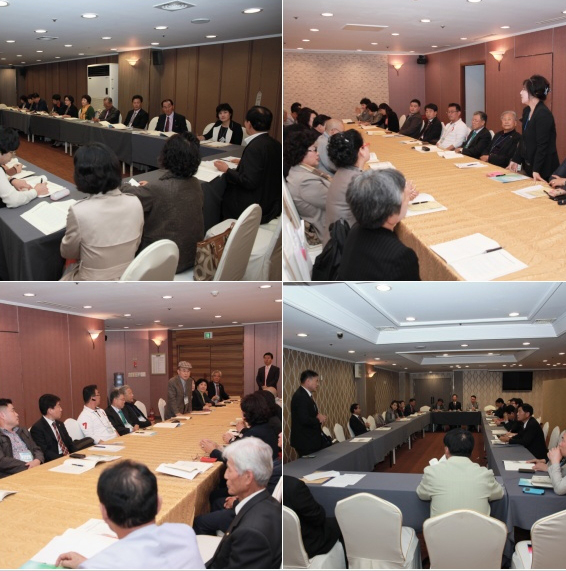
Group Discussion During the Second Policy Conference
On the second day of the conference, attendants listened to a special lecture on "Relieving Stress and Health Care to Improve Work Ability." The policy conference by function was finalized by the presentation of the results of group discussions and comprehensive discussion.











